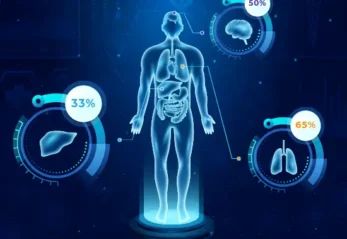In today’s healthcare landscape, generative AI is revolutionizing how we deliver precise and timely responses to patient questions. By leveraging advanced natural language processing (NLP), this technology interacts seamlessly with patients, enhancing their journey and alleviating the workload on healthcare professionals. As patients increasingly seek accurate health information, generative AI stands out as a vital tool, bridging the gap between patient queries and expert medical advice.
Generative AI for Question Answering in Medicine
Generative AI for question answering in medicine is making remarkable progress, particularly in patient support. Utilizing cutting-edge NLP, generative AI adeptly manages a wide range of patient questions, offering prompt and precise answers. It all starts with understanding the patient’s question—AI uses sophisticated algorithms to parse and interpret inquiries, ensuring it grasps the core of the question, whether it’s about symptoms, treatments, or general health advice.
Next, the AI dives into a vast knowledge base. It accesses extensive medical data, including clinical guidelines, research papers, and patient records, to gather relevant information. Once the necessary data is compiled, the AI generates an answer using powerful language models. This ensures patients receive coherent and contextually appropriate responses that are clear and actionable.
Generative AI for question answering combines these technologies to deliver reliable answers to patient questions. By integrating extensive datasets and advanced algorithms, generative AI offers expert-level guidance, benefiting both patients and healthcare providers. This method not only enhances patient support efficiency but also ensures the information is grounded in the latest medical knowledge and best practices.
The Process of Generative AI for Question Answering in Healthcare
Generative AI is making significant strides in healthcare, particularly in patient support. By harnessing advanced NLP, generative AI efficiently handles a broad spectrum of patient questions, providing timely and accurate answers. It all begins with understanding the patient’s question—AI uses sophisticated algorithms to parse and interpret inquiries, ensuring it captures the essence of the question, whether it’s about symptoms, treatments, or general health advice.
Following this, the AI engages in knowledge retrieval. It taps into a vast repository of medical data, including clinical guidelines, research papers, and patient records, to find the most pertinent information. Once the data is collated, the AI generates the answer using powerful language models, crafting responses that are both coherent and contextually appropriate.
To enhance accuracy and relevance, Clinical NLP plays a crucial role. This specialized branch of NLP focuses on medical texts, enabling AI to interpret complex clinical documents effectively. Additionally, medical text summarization techniques condense lengthy documents into concise summaries, making it easier for patients to understand intricate medical information. Through these processes, generative AI not only improves patient support but also streamlines interactions between patients and healthcare providers.
Benefits of Generative AI for Question Answering in Healthcare
Generative AI (GenAI) in healthcare offers transformative benefits that enhance both patient care and operational efficiency. One primary advantage is its ability to provide immediate, precise responses to patient questions, a critical need in scenarios where timely information impacts patient outcomes. Generative AI in medicine handles a vast array of routine questions, freeing healthcare professionals to focus on complex and critical tasks. This boosts efficiency and ensures patients receive consistent, accurate, and reliable answers at all times.
Central to this capability are large language models in healthcare trained on extensive datasets, including medical literature, clinical guidelines, and patient records. These models enable AI systems to understand and generate human-like text, making them adept at responding to complex medical questions. By leveraging large language models, generative AI delivers highly accurate and contextually appropriate answers, enhancing the quality of patient interactions and support.
Moreover, synthetic data generation plays a critical role in developing and refining these AI models. By creating realistic artificial datasets, generative AI trains and validates models without compromising patient privacy or data security. This accelerates the development of robust AI solutions, ensuring they can handle real-world healthcare scenarios.
Integrating generative AI into healthcare question-answering processes not only boosts operational efficiency but also significantly enhances the patient experience. As AI technologies advance, their role in providing comprehensive, accurate medical support will become increasingly indispensable, paving the way for innovative and effective healthcare solutions.
Case Studies of Generative AI Answering Patient Questions
Several case studies highlight the practical applications and benefits of generative AI in answering patient questions, showcasing its potential in various healthcare aspects. For instance, hospitals have successfully implemented AI for appointment scheduling, with AI-driven chatbots managing patient appointments, sending reminders, and rescheduling missed appointments. This streamlines administrative tasks and reduces the burden on healthcare staff.
In chronic disease management, generative AI has proven invaluable. AI systems provide patients with personalized advice and reminders about medication, diet, and lifestyle changes, crucial for managing conditions like diabetes and hypertension. By offering tailored support, AI helps patients adhere to treatment plans and maintain better health outcomes.
Post-operative care is another area where generative AI excels. AI-powered chatbots assist patients during recovery, answering questions about wound care, medication, and follow-up appointments. This support ensures smooth recovery and helps prevent complications, improving overall patient outcomes.
Numerous generative AI healthcare chatbot examples demonstrate the versatility of this technology. These chatbots handle a wide range of inquiries, from symptom checking to providing information on various health conditions. For example, a healthcare organization implemented a chatbot that successfully managed over 70% of patient queries related to COVID-19, significantly reducing the workload on healthcare professionals.
A notable advancement in this field is Healthcare GPT, a specialized language model designed to tackle complex medical questions. These models leverage extensive medical data to provide precise, contextually appropriate answers, further enhancing AI’s capability in healthcare. By integrating Healthcare GPT, providers can ensure patients receive high-quality, reliable information, improving the overall patient experience and care.
These case studies illustrate that generative AI is not just a theoretical concept but a practical tool making a significant impact in healthcare. As technology advances, AI’s role in patient care will expand, offering more innovative solutions for improving healthcare delivery and patient outcomes.
Challenges and Considerations
While generative AI for answering patient questions holds great promise, it also presents challenges and considerations that must be addressed for effective and safe implementation. A significant concern is the accuracy and reliability of medical question answering with generative AI. Ensuring AI systems provide precise, contextually appropriate answers is critical, as incorrect or misleading information can have serious implications for patient health.
Robustness testing is essential to verify AI’s ability to handle a wide range of questions accurately and consistently. This involves rigorous testing to ensure AI can manage diverse queries, understand different contexts, and respond appropriately under various conditions.
Model tuning & validation are also crucial aspects of deploying generative AI in healthcare. This involves fine-tuning AI models to optimize performance and validating them against real-world data to ensure they meet required accuracy and reliability standards. Regular updates and validation keep models current with the latest medical knowledge and practices.
Additionally, ethical considerations such as patient privacy and data security must be meticulously managed. AI systems must protect sensitive patient information and comply with healthcare regulations. Transparency in how AI-derived answers are generated is also vital to maintaining user trust.
Addressing these challenges through thorough testing, validation, and ethical considerations is essential to fully realize generative AI’s potential in healthcare, ensuring it provides safe, reliable, and effective support to patients and healthcare professionals.
Future Trends in Generative AI Questions and Answers for Patient Care
The future of generative question answering in healthcare is set to bring groundbreaking advancements that will further enhance patient care. Generative AI for answering patient questions will continue to evolve with advanced NLP capabilities, enabling more accurate and contextually aware responses. These improvements will allow AI systems to handle more complex queries and provide nuanced answers, making them indispensable tools for both patients and healthcare providers.
One significant trend is the integration with wearables and IoT devices. By combining AI with real-time health data from wearables, patients can receive personalized health advice and monitoring, leading to better disease management and preventive care. This integration ensures AI-driven answers are accurate and tailored to the individual’s current health status.
Enhanced patient education is another promising trend. Generative AI will play a crucial role in delivering personalized educational content, helping patients understand their conditions, treatment options, and health management strategies. This empowers patients to take a more active role in their healthcare, leading to improved outcomes and satisfaction.
Multilingual support will become increasingly important as generative AI systems handle multiple languages seamlessly. This makes healthcare information accessible to a broader audience, breaking down language barriers and ensuring non-English speaking patients receive the same level of care and information as their English-speaking counterparts.
In biomedical applications, advancements in AI will enhance the interpretation of complex medical texts and research, facilitating better decision-making and more effective treatments.
Additionally, machine translation will significantly improve, enabling AI to provide accurate translations of medical information, further broadening access to healthcare resources globally.
These future trends indicate that generative AI will not only enhance patient interactions and support but also integrate deeply into various healthcare aspects, driving innovation and improving overall patient care quality.
Conclusion
Generative AI in healthcare is revolutionizing how patients receive information and support. Leveraging advanced natural language processing, generative AI systems provide accurate, timely, and contextually appropriate responses to patient inquiries, enhancing the overall patient experience. The implementation of generative AI has shown significant promise in various healthcare applications, from appointment scheduling and chronic disease management to post-operative care.
The integration of medical chatbots exemplifies how generative AI can streamline patient interactions, reduce healthcare professionals’ workload, and ensure patients have access to reliable information around the clock. These chatbots handle a wide range of questions, providing consistent and accurate responses, significantly improving patient satisfaction.
Looking ahead, the future of generative AI in healthcare is full of potential. Advancements in NLP capabilities, integration with wearables and IoT devices, enhanced patient education, and multilingual support are set to further transform patient care. These innovations will enable more personalized and effective healthcare solutions, ensuring patients receive the best possible care tailored to their individual needs.
In summary, the use of AI in the healthcare sector is not just a technological step forward but also a significant driver reshaping how patients receive care. As advancements in this field continue, AI is poised to become an essential element in providing top-notch, effective, and tailored healthcare solutions. Embracing AI will result in a more informed, involved, and satisfied patient community. For insights into how generative AI is influencing healthcare, get in touch with us.





























